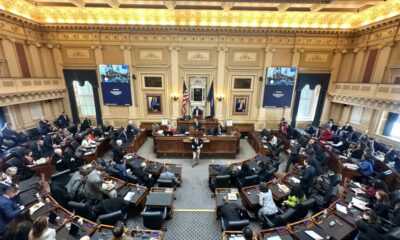News from the South - North Carolina News Feed
An undocumented immigrant in Buncombe tells his story, annotated • Asheville Watchdog
Part three of three
The man held out a red card he carries in his pocket at all times. One side is in his native Spanish. The other, English, the language of the country he entered illegally nearly 20 years ago. It reads:
“I do not wish to speak with you, answer your questions, or sign or hand you any documents based on my 5th Amendment rights under the United States Constitution.”
“I do not give you permission to enter my home based on my 4th Amendment rights under the United States Constitution unless you have a warrant to enter, signed by a judge or magistrate with my name on it that you slide under the door.”
“I do not give you permission to search any of my belongings based on my 4th Amendment rights.”
He hopes — and prays — that neither he, nor any of his family or friends, will ever have to present these cards they all carry in the event they are questioned by immigration officials.
But with the Trump administration vowing to conduct “the largest mass deportation operation in U.S. history,” and threatening Asheville and Buncombe officials if they don’t cooperate, the red card is always at hand while he waits for his green card and long-term legal residency.
“It was terrifying”
“I came here in 2006, 2007,” the man said. “I walked through the desert for four days and four nights to come here. It was terrifying.”
But the prospect of being separated from his family here, and possibly deported, is just as terrifying, he said.
The man works at an industrial enterprise in Buncombe County. He spoke on the condition that neither he nor his employer be identified so that he could speak candidly without fear of reprisals.
“I’ve been working here for more than 15 years,” the man said. “I have four kids. My wife is from a different country, and she has papers here, but mine haven’t been processed yet. I have a lawyer here to help me get a green card. It’s been three years since I applied, and we haven’t seen anything.”
The U.S. limits the number of employment-based green cards — officially known as Permanent Resident Cards — issued each year, and the backlog occurs because the demand far exceeds the available supply. At the start of fiscal year 2024, approximately 34.7 million green card applications were pending, according to the Cato Institute. Given the annual cap of about 1.1 million green cards, only about 3 percent of applicants were expected to receive permanent status last year.
The system for approving or rejecting applications is overburdened. Waits are often measured in years. It’s the same for applications for asylum. In North Carolina at the end of 2023, the most recent data available, there were 24,662 pending asylum applications in the state, and the average wait time for a hearing was more than four and a half years, according to the Transactional Records Access Clearinghouse (TRAC) at Syracuse University.
“I was thinking, if people are here for more than 10 or 15 years, they should get papers, except if they have some kind of criminal record,” the man said.
“Each company has Latinos working, inside, outside, everywhere,” he said. “We work hard in this country, we do our best, and we don’t do bad things. I pay taxes, I do everything, everything, everything. When we do that, they should give us a solution to get papers.”
More paid in than paid out
Although some undocumented workers are paid “under the table” for temporary or infrequent jobs, like housekeeping, many others — despite not having legal status — pay federal, state, and local income taxes, as well as Social Security and Medicare taxes, through payroll deductions by their employers.
According to the American Immigration Council, undocumented immigrants in North Carolina paid an estimated $1.8 billion annually in federal, state, and local taxes. The Social Security Administration (SSA) estimates that undocumented immigrants and their employers nationally contribute around $12 billion per year to Social Security through payroll taxes, even though the workers are ineligible to collect Social Security benefits. They also contribute to Medicare through mandatory payroll deductions, but rarely receive benefits.
Undocumented immigrants also contribute billions of dollars in sales taxes through everyday purchases, such as gas, clothing, and groceries, and indirectly pay property taxes, through rent payments, that fund local services like schools and infrastructure.
The government does grant undocumented immigrants a handful of benefits that are deemed necessary to protect life or guarantee safety in dire situations, such as emergency Medicaid, access to treatment in hospital emergency rooms, or access to healthcare and nutrition programs under the Special Supplemental Nutrition Program for Women, Infants, and Children (WIC).
Latinos who risk their lives to come here are not expecting handouts, or the high life, the man said. In his case, he said, he had a nicer home in Mexico than the one he has here, and had attended college. His job in Buncombe requires physical labor every day, in a demanding environment. But his long-term prospects are better in America, he said.
Returning to his native country is not possible, he said.
“Where my family lives in Mexico, two cartels are fighting,” he said. “They take families out of houses and shoot them. A lot of people die, it’s terrible. I’m worried for my parents. I want to bring my parents here, but I can’t.”
“I don’t do anything bad, and I’m working hard. I love this country, and I want to stay here,” he said.
But he’s scared, he said. “Last night we went to church, and my friends were telling me, ‘You don’t want to go to church because of ICE.’”
Within hours of taking office, President Trump issued an executive order instructing Immigration and Customs Enforcement (ICE) agents to ignore Biden administration restrictions against entering and arresting people in “sensitive” areas, including schools, churches, hospitals and doctor’s offices, daycare centers, funerals, and weddings.

His biggest fear, the man said, is being taken away, separated from his wife and children.
“If we don’t have papers here, we will always be scared,” he said. “But right now, when Trump’s president, we are more scared.”
“We are hiring them legally”
The man’s employer also spoke on condition of anonymity.
“Probably 60 percent of our workforce is Hispanic,” the employer said. “All of our employees are run through E-Verify. They have to have two forms of identification. So all of our employees have gone through all the legal proceedings to be qualified as legal employees of this company.”
E-Verify is an internet-based system through which businesses electronically confirm the employment eligibility of their workers. The employee fills out a verification form and that information is matched against U.S. Department of Homeland Security and Social Security Administration databases.
Undocumented immigrants use stolen or false names and Social Security numbers and forged documents to pass through the E-Verify system. In those cases, it’s unclear whether the worker or employer is exploiting the loophole.
“If their documents look legitimate and feel legitimate, and we question them beyond that, that’s considered discrimination,” the employer told Asheville Watchdog. “We don’t discriminate against our employees. We take their documents and we submit them, and then it’s E-Verify’s job to verify that those are legal documents.”
Once the employee is cleared, “all of their taxes get deducted from their paycheck,” the employer said. “All of that gets reported and deducted for their pay scale and everything. Their tax money goes to the government, just like any other employee’s would.”
Concern about workplace immigration raids in Buncombe is growing among area employers.
“If a police officer or an ICE agent shows up at our door, we’re not going to willingly aid them unless we are required to by the confines of the law,” the employer said. “This is private property, not government property. So if anyone shows up and wants to search our premises, they need a judicial warrant. If they don’t have a judicial warrant, they’re not necessarily welcome to come search our property and ask questions.”
Going after employers
The Trump administration has signaled that it intends to use the Internal Revenue Service and its agents to pursue undocumented immigrants and their employers.
In a Feb. 7 memo to Treasury Secretary Scott Bessent, Department of Homeland Security Secretary Kristi Noem requested the IRS pursue financial audits of businesses suspected of having undocumented workers, and to deputize IRS agents to assist U.S. Immigration and Customs Enforcement with apprehensions, detentions, and removals of individuals who are in the country without authorization.
The deportation of potentially hundreds or thousands of undocumented immigrants who are working in Buncombe County would have far-reaching consequences for local employers, some of whom are themselves undocumented.
In campaign speeches, Trump said he would deport “between 15 and 20 million individuals,” although the number of undocumented immigrants is generally estimated to be 11 million. Trump’s “border czar,” Tom Homan, clarified: “Bottom line is, under Trump he’s still going to prioritize national security threats and criminals. But no one’s off the table. If you’re in the country illegally, it’s not OK. If you’re in the country illegally, you better be looking over your shoulder.”

Doug Brown, chairman of the Buncombe County Republican Party, told The Watchdog via email that because the Trump administration is deporting only criminals, the impact on Buncombe County’s labor force will be minimal.
“Venezuelan gangs, pedifiles[sic], and criminals are not our workforce,” Brown wrote. “So, if you are working, such as landscaping or washing dishes, as opposed to being a criminal, your gamble to enter the USA illegally is probably a safe gamble.”
Removing people who entered the United States without authorization “would save us money spent combating the crime, treating the wounded victims, replacing the stolen merchandise, over-burdening our police and sheriff departments — costly consequences of letting millions of people illegally enter our country,” Brown wrote.
Research shows that immigrants — including those who are undocumented — are less likely to commit crimes than U.S.-born residents, according to the American Immigration Council. As of Feb. 9, there were 41,169 ICE immigrant detainees in custody, according to TRAC. More than half, 54.7 percent, had no criminal record, and many more had only minor offenses, including traffic violations.
What are your rights?
Rebecca Sharp, the founder and director of La Esperanza, an outreach program of the Episcopal Church of the Holy Spirit in Mars Hill that serves Latino families in Buncombe, Madison, and Yancey counties, said preparations are already under way to help immigrants deal with the expected increase in enforcement.

“We are preparing by educating them,” Sharp said. “We work with Pisgah Legal to do workshops so they can learn about their rights. You know, what are your rights if someone comes to your door? What are your rights if someone pulls you over? What rights do the police have, and not have, to ask you for immigration papers?”
The U.S. Supreme Court has upheld that certain constitutional rights — excluding the right to vote — extend to everyone living within the U.S., not just natural-born citizens or legalized immigrants. This includes “due process” protections under the Fifth, 10th, and 14th amendments.
ICE enforcement officers typically use administrative removal warrants — signed by agency administrators, not judges or magistrates — to carry out their duties. Unlike a criminal warrant issued by the federal court, a removal warrant for civil violation of immigration laws does not authorize the ICE officer to enter into a home, school, church, or other restricted area to execute the warrant — unless invited to enter.
If refused entry, the ICE agents must obtain a judicial warrant or wait until the subject of the administrative warrant leaves the house or other private area. For many undocumented immigrants, that means every trip to the grocery store, to work, to take children to school — even to go to the doctor — becomes a frightening risk.
“I have heard that there are people that are too scared to leave their houses,” Sharp said. “For the most part, you can’t do that. You have to get food, you have to work, you have to pay the bills, but there are people that are definitely lying low more than in the past.”
La Esperanza also works with Pisgah Legal Services to help immigrants on the typically complex path to long-term lawful immigration status.
Originally called Mujeres Unidas en Fe (women united in faith), the nonprofit organization changed its name to La Esperanza (the hope) as the numbers of volunteers expanded. It now supports dozens of immigrant families in western North Carolina.
“We’re going to continue to support the community, and that includes people of all legal statuses,” Sharp said. “I’m not going to go up to people and say ‘Hey, by the way, are you undocumented or not?’ That’s not my concern. My focus is saying ‘Okay, you need help. You can’t pay your bills? Let’s get you some help. You have cancer? Let’s get you a doctor.’”
Rumors of ICE activity in western North Carolina — most of them untrue — spread via social media, Sharp said.
“We educate people that social media can overwhelmingly be evil,” Sharp said. “People say ‘Well, I saw on social media that ICE is here. I saw on social media that my neighbor can turn me in.’ So I’m telling people, get off social media. Really look for groups and gatherings with people that you trust.”
Asheville Watchdog is a nonprofit news team producing stories that matter to Asheville and Buncombe County. John Boyle is a staff reporter and columnist. You can reach him at (828) 337-0941, or via email at jboyle@avlwatchdog.org. Peter H. Lewis is The Watchdog’s executive editor. Email plewis@avlwatchdog.org. Linus Schafer-Goulthorpe is a student reporting intern. The Watchdog’s local reporting is made possible by donations from the community. To show your support for this vital public service go to avlwatchdog.org/support-our-publication/.
Related
The post An undocumented immigrant in Buncombe tells his story, annotated • Asheville Watchdog appeared first on avlwatchdog.org
News from the South - North Carolina News Feed
Ideas for helping NC child care industry are solidifying, but a top suggestion faces headwinds
SUMMARY: North Carolina’s Child Care Task Force, led by Gov. Josh Stein, Lt. Gov. Rachel Hunt, and Sen. Jim Burgin, is addressing child care affordability, workforce pay, and financial stability, especially in rural areas. Child care providers struggle financially due to low subsidies and high costs, with infant care averaging $11,720 annually statewide. Owners like Halee Hartley and Annette Anderson-Samuels work multiple jobs to sustain their centers. The task force prioritizes raising minimum subsidy reimbursement rates to support providers equitably across counties. Discussions include establishing a child care endowment fund, leveraging philanthropy to supplement funding amid uncertain state and federal budgets.
The post Ideas for helping NC child care industry are solidifying, but a top suggestion faces headwinds appeared first on ncnewsline.com
News from the South - North Carolina News Feed
Court docs show Harris Lake boating suspect had prior legal troubles
SUMMARY: Court documents reveal Quinton Kite, charged with causing a deadly boating accident at Harris Lake that killed a 10-year-old girl and critically injured a woman, had prior legal troubles. Kite was out on a $15,000 bond from a December 2023 felony hit-and-run charge involving Alex Meyers, who was seriously injured but survived. Dashcam and security footage showed Kite’s damaged truck after leaving the crash scene. Meyers expressed frustration that earlier legal action might have prevented the tragedy. Additionally, court records from New Mexico show Kite pleaded no contest to a 2009 DUI charge, completed probation, and attended DWI school.
That includes arrests in 2009 and pending charges from a hit-and-run in 2023 that injured a Vass resident.
https://abc11.com/post/quinten-kight-court-documents-reveal-prior-legal-troubles-man-charged-harris-lake-boating-tragedy/17435804/
Download: https://abc11.com/apps/
Like us on Facebook: https://www.facebook.com/ABC11/
Instagram: https://www.instagram.com/abc11_wtvd/
Threads: https://www.threads.net/@abc11_wtvd
TIKTOK: https://www.tiktok.com/@abc11_eyewitnessnews
X: https://x.com/ABC11_WTVD
News from the South - North Carolina News Feed
We saw a human skeleton in this video.
SUMMARY: The video showed a human skeleton, deeply affecting the family, especially their brother, Evatar, who is critically ill and near death. He’s described as a kind, musical soul who plays guitar, sharing music with the narrator, who plays the piano. The family is devastated, unable to watch the video, but focused on saving him. Doctors say Evatar has only days left and urgently needs food, medical care, and vitamins to survive. Despite his fragile state, his spirit remains unbroken, and both he and his family believe he will recover. The narrator longs for his warm hugs and smile.
ABC News’ Ian Pannell spoke to the brother of Evyatar David, an Israeli hostage seen in footage released by Hamas over the weekend.
Evyatar’s brother, Ilya, says the release of the video “crushed” his family and that doctors say his sibling has only a “few days to live.”
via @ABCNews
-
News from the South - Texas News Feed6 days ago
Rural Texas uses THC for health and economy
-
Mississippi Today2 days ago
After 30 years in prison, Mississippi woman dies from cancer she says was preventable
-
News from the South - Kentucky News Feed7 days ago
Harrison County Doctor Sentenced for Unlawful Distribution of Controlled Substances
-
News from the South - Texas News Feed7 days ago
Released messages show Kerrville officials’ flood response
-
News from the South - Alabama News Feed6 days ago
Decision to unfreeze migrant education money comes too late for some kids
-
News from the South - Louisiana News Feed7 days ago
‘Half-baked’ USDA relocation irritates members of both parties on Senate Ag panel
-
News from the South - Georgia News Feed3 days ago
Woman charged after boy in state’s custody dies in hot car
-
Mississippi Today6 days ago
They own the house. Why won’t they cut the grass?













































